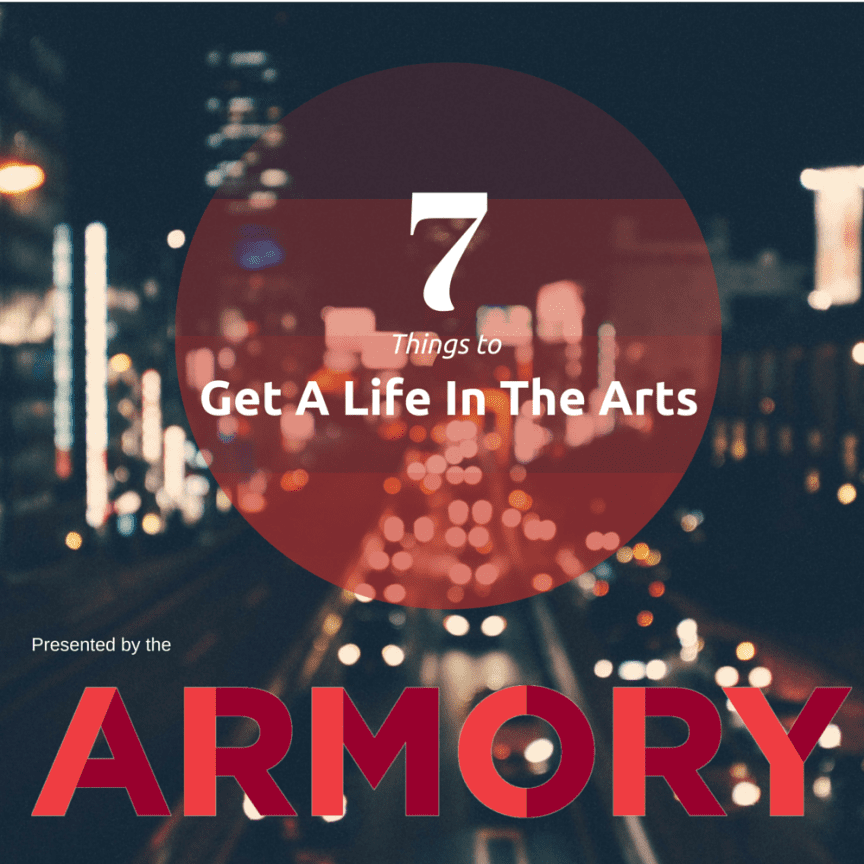Want to Get a Life in the Arts? 7 Things You Need Now


The Armory Relaunches Get a Life in the Arts
by Janine Christiano
Every artist has particular tools they use to create their art and express themselves…pencils, brushes, a laptop, pedals, bows, etc. There are also personal, behavioral tools that every young artist should start to acquire if they want a successful career in the arts. Here they are in no particular order, they are ALL important.

1. Get A Life In The Arts With People and Relationship Skills – No one is an island.
Toss the cliched image of the solitary, anti-social artist out the door, successful artists will need the support and help of other people…even you brooding, difficult ones (you know who you are!). Just some of people you may interact with include patrons, curators, and dealers. Or if you are a musician, bookers, producers, studio engineers, and many more, not to mention other collaborators, bandmates, etc. So there are a lot of people you will need to work with along the way. This means knowing how to speak to people, how to listen actively, how to work through conflict, and how to engage with them so they want to continue to work with you and support you as an artist.

2. Get A Life In The Arts When Talent Meets Practice, Practice, Practice
You don’t have to to be a technical wiz or virtuoso to have a successful career in the arts, but you do need to continually hone your skills, keep up to date on what other artists in your field are doing, and push your own personal limits. As the famous joke goes…”How do you get to Carnegie Hall? Practice, practice, practice.” It may be a gag, but it’s great advice for artists across all fields.

3. Get A Life In The Arts And A Mentor
Unless you are caveman who who has somehow managed to survive into the modern era (preserved cryogenically after an avalanche?), you are probably not the first person to practice the type of art you practicing or the first person to try to achieve what you are trying to accomplish. We all stand on the shoulders of the people that came before us. Don’t ignore that, use it to your advantage, and connect with someone in your field that you admire; this can be an instructor, a peer that has been working in a particular field a little longer, or just someone in the community you are a fan of. Learn from their experiences and take advantages of the people and opportunities they can introduce you to. Most successful people enjoy the opportunity to share their knowledge with the next generation. So figure out who you would want to mentor you, and then just ask.

4. Get A Life In The Arts With A Work Ethic And Personal Accountability
Making deadlines, getting to places on time, following through on your word, managing your time wisely, prioritizing, and being responsible for your work make accomplishing your artistic goals a lot easier. Even if you have assembled a great support team and found an amazing mentor, you will still ultimately be responsible for your career and need to take responsibility for all the aspects of your work and life. So put in the hours needed, get organized, and get it done. It’s really up to you.

5. Get A Life In The Arts With A Plan
Think about the life you want, the types of things you want to be doing, and where you want to be in the future…then figure out some of the steps needs to get you there, and start working towards your goal, but be flexible if things don’t go exactly how you planned them, and stay persistent. Artists rarely have straightforward career paths, but it will still be helpful to set goals and work toward them. Also be realistic, talk to other artists working in the same field, figure out what your expenses will be, take a look at what job listings are regularly posted, and see what people get paid to do the type of work you want to do. The more information you have and the more clear you can be about your career goals, the more likely you will be to getting the arts career you want.

6. Get A Life In The Arts With Some Real World Experiences
But how will you really know you want to pursue a career in the arts? Get out there and see what it’s like to really do the job. Internships are so important to figuring out what you really want to be doing and will give you that sneak peak into what a job or particular industry is really like. Better to find out sooner than later that you hate working in architecture and would rather be working in the entertainment field, or whatever paths you are interested in. Talk to your teacher or counselor and see what internship opportunities are available. Go to job fairs. Ask around. Like everything you do in the arts, else you will need to be creative and persistent.

7. Get A Life in the Arts and Some Downtime!
And lastly, make time for downtime. Yes that’s right, make time for doing…nothing. With all the pressure around to “make it” and with all the information you are absorbing constantly it’s important for you to just give yourself a break now and then. You’ll be able to retain more of the information being thrown at you and it will allow you to be even more creative and productive. The Armory Center for the Arts is partnering with Artzray and relaunching their Get a Life in the Arts Initiative that incorporates the tools above in addition to other arts experiences in order to give young artists the opportunity to get an arts career. To find out more about it stay tuned to Artzray or go to the Armory’s website.
The Armory builds on the power of art to transform lives and communities through creating, teaching and presenting the arts. It originated as the education department of the Pasadena Art Museum in 1947. The Armory has been at the forefront of art education in southern California for more than 60 years. Classes were led by artists whose teaching concepts grew out of the museum’s exhibitions of modern modern art. Today, we maintain our commitment to providing accessible public spaces for the exhibition of contemporary art and to providing meaningful experiences in art education.

